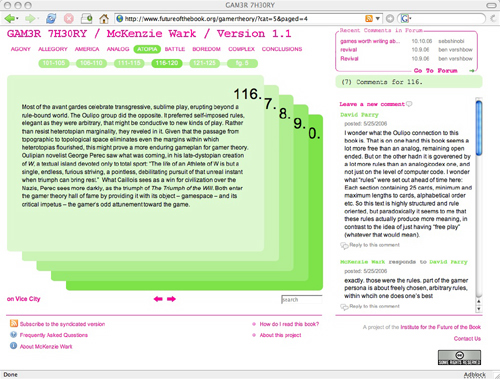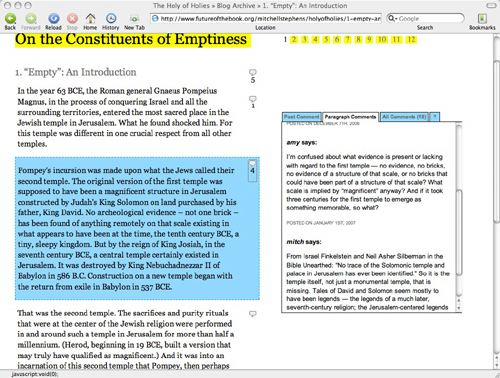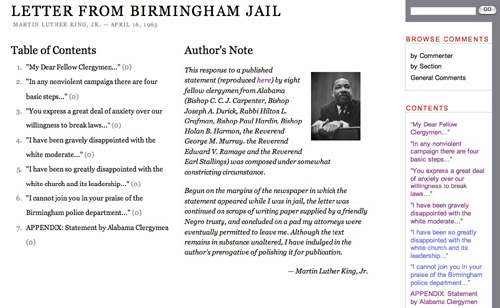At long last, we are pleased to release CommentPress, a free, open source theme for the WordPress blog engine designed to allow paragraph-by-paragraph commenting in the margins of a text. To download it and get it running in your WordPress installation, go to our dedicated CommentPress site. There you’ll find everything you need to get started. This 1.0 release represents the most basic out-of-the-box version of the theme. Expect many improvements and new features in the days and weeks ahead (some as soon as tomorrow). We could have kept refining it for another week but we felt that the time was well past due to get it out in the world and to let the community development cycles begin. So here it is:
/commentpress/ »
This little tool is the happy byproduct of a year and a half spent hacking WordPress to see whether a popular net-native publishing form, the blog, which, most would agree, is very good at covering the present moment in pithy, conversational bursts but lousy at handling larger, slow-developing works requiring more than chronological organization – ?whether this form might be refashioned to enable social interaction around long-form texts. Out of this emerged a series of publishing experiments loosely grouped under the heading “networked books.” The first of these, McKenzie Wark’s GAM3R 7H30RY 1.1, was a wildly inventive text whose aphoristic style and modular structure lent it readily to “chunking” into digestible units for online discussion. This is how it ended up looking:

In the course of our tinkering, we achieved one small but important innovation. Placing the comments next to rather than below the text turned out to be a powerful subversion of the discussion hierarchy of blogs, transforming the page into a visual representation of dialog, and re-imagining the book itself as a conversation. Several readers remarked that it was no longer solely the author speaking, but the book as a whole (author and reader, in concert).
Toying with the placement of comments was relatively easy to do with Gamer Theory because of its unusual mathematical structure (25 paragraphs per chapter, 250 words or lessper paragraph), but the question remained of how this format could be applied to expository texts of more variable shapes and sizes. The breakthrough came with Mitchell Stephens’ paper, The Holy of Holies: On the Constituents of Emptiness. The solution we found was to have the comment area move with you in the right hand column as you scrolled down the page, changing its contents depending on which paragraph in the left hand column you selected. This format was inspired in part by a WordPress commenting system developed by Jack Slocum and by the Free Software Foundation’s site for community review of drafts of the GNU General Public License. Drawing on these terrific examples, we at last managed to construct a template that might eventually be exported as a simple toolset applicable to any text.

Ever since “Holy of Holies,” people have been clamoring for us to release CommentPress as a plugin so they could start playing with it, improving it and customizing it for more specialized purposes. Now it’s finally here, with a cleaned-up codebase and a simpler interface, and we can’t wait to see how people start putting it to use. We can imagine a number of possibilities:
-? scholarly contexts: working papers, conferences, annotation projects, journals, collaborative glosses
-? educational: virtual classroom discussion around readings, study groups
-? journalism/public advocacy/networked democracy: social assessment and public dissection of government or corporate documents, cutting through opaque language and spin (like our version of the Iraq Study Group Report, or a copy of the federal budget, or a Walmart press release)
-? creative writing: workshopping story drafts, collaborative storytelling
-? recreational: social reading, book clubs
Once again, there are dozens of little details we want to improve, and no end of features we would love to see developed. Our greatest hope for CommentPress is that it take on a life of its own in the larger community. Who knows, it could provide a base for something far more ambitious.
An important last thought, however. While CommentPress presents exciting possibilities for social reading and writing on the Web, it is still very much bound by its technical origins, the blog. This presents significant limitations both in the flexibility of document structures and in the range of media that can be employed in writing and response. Sure, even in the current, ultra-basic version, there’s no reason a CommentPress document can’t incorporate image, video and sound embeds, but they must be fit into the narrow and brittle textual template dictated by the blog.
All of which is to say that we do not view CommentPress or whatever might grow out of it as an end goal but rather as a step along the way. In fact, this and all of the experiments mentioned above were undertaken in large part as field research for Sophie, and they have had a tremendous impact on its development. While there is still much work to be done, the ultimate goal of the Sophie project is to make a tool that handles all the social network interactions (and more) that CommentPress does but within a far more fluid and easy-to-use composition/reading space where media can mix freely. That’s the larger prize. For the moment though, let’s keep hacking the blog to within an inch of its life and seeing what we can discover.
A million thanks go out to our phenomenal corps of first-run testers, particularly Kathleen Fitzpatrick, Karen Schneider, Manan Ahmed, Tom Keays, Luke Rodgers, Peter Brantley and Shana Kimball, for all the thoughtful and technically detailed feedback they’ve showered upon us over the past few days. Thanks to you guys, we’re getting this out of the gate on solid legs and our minds are now churning with ideas for future development.
Here is a chronology of CommentPress projects leading up to the open source release (July 25, 2007):
GAM3R 7H30RY 1.1 by McKenzie Wark (launched May 22, 2006)
The Holy of Holies: On the Constituents of Emptiness by Mitchell Stephens (December 6, 2006)
The Iraq Study Group Report with Lapham’s Quarterly (December 21, 2006)
The President’s Address to the Nation, January 10th, 2007 with Lapham’s Quarterly (together, the Address and the ISG Report comprised Operation Iraqi Quagmire) (January 10, 2007)
The Future of Learning Institutions in a Digital Age with HASTAC (Humanities, Arts, Science, and Technology Advanced Collaboratory) (January 17, 2007)
Scholarly Publishing in the Age of the Internet by Kathleen Fitzpatrick, published at MediaCommons (March 30, 2007)
(All the above are best viewed in Firefox. The new release works in all major browsers and we’re continuing to work on compatibility.)



